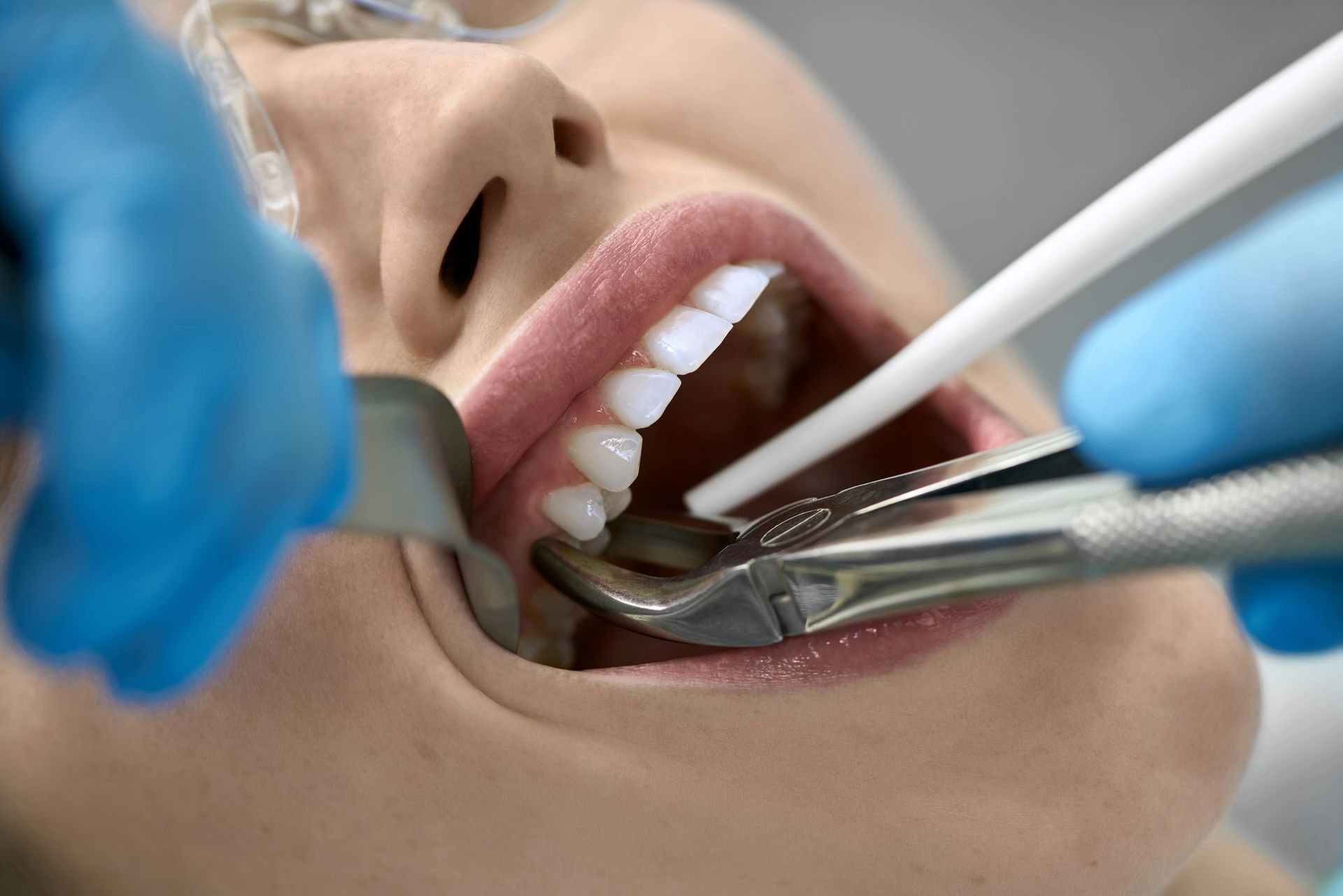By Isaiah Davis
•
February 26, 2026
Losing multiple teeth—or facing the reality that most of your remaining teeth are failing—can feel overwhelming. Beyond the obvious challenges with eating and speaking, there's the emotional weight of watching your facial structure change, your confidence diminish, and your quality of life decline. If you're researching solutions in Columbia, SC, you've likely encountered the term "All on 4 implants," and you may be wondering if this advanced full arch restoration could truly restore not just your smile, but your entire way of living. At Design Dentistry Columbia , Dr. Ike has helped countless patients rediscover the comfort, function, and confidence that comes with a complete, permanently anchored smile through this transformative treatment. Full mouth rehabilitation represents one of the most significant investments you'll make in your health and well-being, which is why understanding exactly what the process entails—and choosing the right dental partner—matters tremendously. The All on 4 dental implants approach has revolutionized how we restore entire arches of missing teeth, offering a streamlined solution that provides immediate results without the extended timelines and bone grafting procedures that traditional implant methods often required. For families and adults in Columbia seeking quality dental care that combines cutting-edge technology with personalized attention, this treatment represents a pathway back to normalcy that once seemed impossible. The journey toward complete smile restoration begins with understanding your unique situation, and at Design Dentistry Columbia, that starts with Dr. Ike's comprehensive evaluation of your oral health, bone structure, and personal goals. This isn't a one-size-fits-all solution—it's a carefully planned procedure tailored specifically to your anatomy and lifestyle needs. Understanding the All on 4 Implant Foundation The All on 4 concept represents an elegant solution to a complex problem. Rather than replacing each missing tooth with an individual implant—a process that would require extensive surgery, prolonged healing, and considerable expense—this technique strategically places four dental implants in precise locations within your jaw to support an entire arch of prosthetic teeth. The implants themselves are titanium posts that integrate with your jawbone through a natural process called osseointegration, creating a foundation as stable as natural tooth roots. What makes this approach particularly sophisticated is the strategic angulation of the posterior implants. Dr. Ike positions the back implants at specific angles that maximize contact with existing bone, often eliminating the need for bone grafting procedures that would otherwise delay treatment by several months. The two anterior implants are placed vertically in the front of the jaw where bone density is typically strongest. This configuration distributes bite forces evenly across the arch while providing exceptional stability for your new teeth. At Design Dentistry Columbia, we utilize advanced 3D imaging technology to plan every aspect of your procedure with precision. This diagnostic approach allows Dr. Ike to identify the optimal implant positions before surgery even begins, ensuring predictable outcomes and minimizing any guesswork. For patients in Columbia, SC, this means accessing the same level of technological sophistication you'd find at major metropolitan dental centers, delivered with the personalized care of a practice that truly knows its community. The Transformation Timeline: From Consultation to Completed Smile One of the most appealing aspects of dental implants through the All on 4 method is the accelerated timeline compared to traditional full mouth reconstruction. Your journey at Design Dentistry Columbia begins with an in-depth consultation where Dr. Ike examines your oral health, takes comprehensive imaging, and discusses your expectations. This initial visit establishes the foundation for your entire treatment plan. On the day of your procedure, Dr. Ike places all four implants during a single surgical appointment. If you have remaining teeth that need extraction, this happens during the same visit. What truly sets this treatment apart is that you don't leave our Columbia office without teeth—a temporary prosthetic arch is attached to your new implants the same day, allowing you to eat soft foods and smile confidently while your implants integrate with your bone over the following months. This immediate functionality represents a dramatic departure from older implant protocols that left patients without teeth for extended periods. The temporary restoration not only protects your implants during healing but also maintains your facial structure and allows you to adjust to your new bite. After approximately three to six months of healing, you'll return to Design Dentistry Columbia for your final prosthetic arch—a custom-crafted restoration designed for both beauty and durability. Dr. Ike works closely with skilled laboratory technicians to ensure your permanent teeth match your facial proportions, complement your features, and feel completely natural. Life After Full Arch Restoration: What to Expect The true measure of successful restorative dentistry isn't just the immediate result—it's how that restoration performs over years and decades. Patients who complete All on 4 treatment at Design Dentistry Columbia consistently report that the investment transformed not just their smile, but their entire lifestyle. Eating becomes enjoyable again, with the ability to bite into crisp vegetables, savor a perfectly grilled steak, or enjoy corn on the cob without hesitation or discomfort. Your new teeth are designed to look and feel remarkably natural. The prosthetic arch is carefully shaped to support your lips and facial contours, often taking years off your appearance by restoring the structural support that was lost with your natural teeth. The color, shape, and arrangement of the teeth are customized to look authentic and age-appropriate, avoiding the artificial appearance that sometimes plagued older dental restorations. Maintaining your All on 4 implants requires commitment to excellent oral hygiene, but the routine is straightforward. You'll brush and use specialized flossing tools to keep the area around your implants clean, and you'll visit Design Dentistry Columbia regularly for professional cleanings and examinations. Dr. Ike monitors your implants, checks the integrity of your prosthetic arch, and ensures everything continues functioning optimally. With proper care, your All on 4 restoration can last for many years, making it one of the most durable tooth replacement options available. Why Choose Design Dentistry Columbia for Your Full Mouth Restoration Selecting the right practice for something as significant as full arch restoration requires careful consideration. This isn't a routine filling or cleaning—it's a complex procedure that demands surgical expertise, aesthetic sensibility, and a commitment to long-term patient care. Design Dentistry Columbia has built its reputation in Columbia, SC, on precisely these qualities, with Dr. Ike bringing advanced training and a patient-centered philosophy to every case. What distinguishes our approach is the combination of clinical excellence and genuine personal attention. From your first consultation through your final restoration and beyond, you'll work with the same dedicated team who knows your case intimately. We understand that families and adults seeking quality dental care value consistency, transparency, and results they can trust. The investment you're making deserves a partnership with professionals who will be there not just for the procedure itself, but for the lifetime of care that follows. If you've been living with failing teeth, uncomfortable dentures, or the gaps left by tooth loss, you owe it to yourself to explore what modern dentistry can accomplish. The All on 4 solution available at Design Dentistry Columbia represents more than just a dental procedure—it's an opportunity to reclaim the confidence, comfort, and quality of life you deserve. Dr. Ike and our entire team would be honored to discuss whether this treatment is right for your unique situation. We invite you to schedule a consultation at our Columbia office to learn more about full mouth restoration with All on 4 implants . Call Design Dentistry Columbia today at 803-255-0200 to take the first step toward your complete smile transformation. Your journey to renewed confidence and lasting oral health begins with a single conversation—let's start that conversation today.












